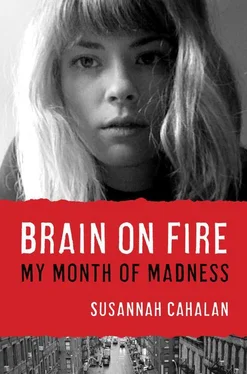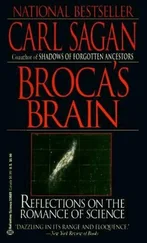Dr. Russo led me back to the bed several times, calling for the help of a nurse’s assistant. She green-lighted a dose of Haldol, an antipsychotic. Later, typing up her impressions at the nurses’ station, she wrote that the “patient appears to be manic and psychotic.” She had two possible diagnoses: “First presentation of bipolar, versus postictal psychosis.” “Ictal” means seizure, so postictal psychosis is psychotic behavior following a cluster of seizures. PIP, as it’s called, can persist for as little as twelve hours or as long as three months, but the mean is about ten days. 14In 1838 a French psychiatrist described the condition as “postictal fury. 15” A quarter of psychotic people treated in epilepsy wards suffer from PIP. 16
Later that morning, the third doctor, William Siegel, arrived alone. He introduced himself to me and then to my mother, who was already aware of his stellar reputation. A day earlier, she had mentioned his name to her general practitioner, who had said: “You got Siegel? How did you pull that off?” Siegel was charismatic and approachable. After the neurological exam, he extended his hand to my mother and said, “We will figure this out. Susannah will be fine.” My mother clung to these words like a life raft and nicknamed the doctor “Bugsy”—her own doctor gangster.
CHAPTER 17
MULTIPLE PERSONALITY DISORDER
The mind is like a circuit of Christmas tree lights. When the brain works well, all of the lights twinkle brilliantly, and it’s adaptable enough that, often, even if one bulb goes out, the rest will still shine on. But depending on where the damage is, sometimes that one blown bulb can make the whole strand go dark.
The day after we met Dr. “Bugsy,” Dr. Sabrina Khan from the Department of Psychiatry arrived and introduced herself to Stephen and me. She was the fourth doctor to join the team and had already heard about my two escape attempts: one in the early morning and one this afternoon with Dr. Russo. In her progress note, Dr. Khan described me as slightly disheveled and fidgety, wearing “revealing pajamas” (my tight leggings and a see-through white shirt) and playing with my dangling EEG leads. It was important for her to provide a visual picture to match the psychological one, because my rumpled, suggestive appearance could be a sign of mania: those on a high often forgo grooming and exhibit less impulse control, engaging in destructive acts like sexual promiscuity. Though I had no previous history of mental illness, I was within the age range for psychotic breaks, which tend to occur in the late teens or early twenties, but also frequently happen later in life for women. 17
While she was writing, I announced, unprompted, “I have multiple personality disorder.”
Dr. Khan nodded patiently. I had picked one of the most controversial diagnoses in the field of psychiatry. 18Now called dissociative identity disorder (DID), it is a condition where a person exhibits several distinct and entirely separate identities, to the point that the patient is often unaware of the other “selves.” Some doctors believe it exists, and others do not (especially in light of news that its poster child, Sybil, was a fraud). Many patients conflate DID with other types of mental illnesses, like schizophrenia. In any case, I was clearly confused.
“Have you been diagnosed by any psychiatrist or psychologist in the past?” she asked gently.
“Yes. A psychiatrist said I had bipolar disorder.”
“And were you taking any medication for that?”
“I refused to take it. I spit it out. I need out of here. I don’t belong here. I belong in a psychiatric ward. I belong in Bellevue. It’s not safe for me here.”
“Why is it not safe for you here?”
“Everyone is talking about me. They’re all talking about me and making fun of me behind my back. I belong in Bellevue where they can take care of my disorder. I don’t know why I’m here. I can hear what the nurses are saying about me. I can hear their thoughts, and they aren’t saying nice things.”
Dr. Khan wrote down “paranoid ideation.”
“You can hear their thoughts?” she repeated.
“Yes. The whole world is making fun of me.”
“What else can you hear?”
“The people on the TV are talking about me too.”
Dr. Khan wrote “ideas of reference,” a patient’s belief that newspaper articles, songs, or TV shows refer directly to him or her. “Do you have any history of family members with mental illness?”
“I don’t know. My grandmother might have had bipolar disorder. But they’re all crazy.” I laughed. Then I turned on her. “You know that I have the right to sign myself out, right? I can walk out of here. I can’t legally be held here against my will. I don’t want to talk anymore.”
Dr. Khan wrote down her differential diagnoses, which included “Mood Disorder, not otherwise specified” and “Psychotic Disorder, not otherwise specified.” She was concerned that, in light of the seizures and my history of melanoma, they should be looking for neurological causes.
If there was no underlying disease that could explain my sudden psychosis, she suggested bipolar I as a possible explanation. Bipolar I is a mood disorder characterized by a manic or mixed (both manic and depressive) episode. On a scale from 1 (most dire cases) to 100 (no symptoms), I received a score of 45, which translated to “serious symptoms. 19” Dr. Khan recommended that the staff assign me a security guard, called a one-to-one, to try to prevent future escape attempts.
I can’t hear their voices anymore. Her skin is so smooth. I stare at the doctor’s cheekbones and pretty olive skin. I stare harder, harder, harder still. Her face swirls before me. Strand by stand her hair turns gray. Wrinkles, first just around her eyes, and then around her mouth and across her cheeks, now line her entire face. Her cheeks sink in, and her teeth turn yellow. Her eyes begin to droop, and her lips lose their shape. The striking young doctor ages right before my eyes.
I turn away and look at Stephen, who stares back at me. Stephen’s stubble morphs from brown into a muted gray; his hair turns white like snow. He looks like his father. Out of the corner of my eye, I watch the doctor. Now she is growing more radiant with each passing second. All the wrinkles on her face smooth out, her eyes grow pert and oblong, her cheeks gain baby fat, and her hair turns a deep chestnut brown. She’s thirty, twenty, thirteen.
I have a gift. I can age people with my mind. This is who I am. And they cannot take this away from me. I am powerful. Stronger than I have ever been in my life.
Later that same day, a fifth doctor joined the team. My case had piqued the interest of Dr. Ian Arslan, a psychopharmacologist who topped six feet and who looked more like an aging hippie than a doctor. Because of his fondness for beat generation writers and his cerebral way of communicating abstract medical jargon, a colleague described him as a “walking beatnik dictionary.”
He had already heard about my escape attempts and paranoid delusions, so he approached my mother first, asking her to walk him through the past few weeks of my bizarre behavior. Then he interviewed my father. After a short interview with me, which yielded a vivid portrait of my dysfunction, he gathered statements from the nursing staff and even called up Dr. Bailey, who, according to Arslan’s notes, told him that I “drank excessively up to two bottles of wine per night.” Dr. Bailey’s estimate of my vices seemed to have substantially increased. Having summarized all of this, Dr. Arslan jotted down the two diagnoses he wanted to rule out: postictal psychosis and schizoaffective disorder. Knowing it would upset them, he did not share the second diagnosis with my parents.
Читать дальше












